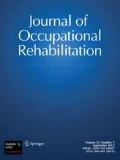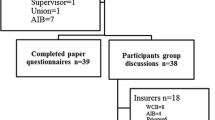Abstract
Purpose
Work disability stakeholders may not share the same understanding and solutions among themselves or with researchers, causing misunderstandings and hindering collaboration regarding solutions for preventing work disability. To reduce such differences, this study sought to build a common vocabulary among stakeholders and researchers, using a transdisciplinary research framework.
Methods
A consensus method based on a constructivist approach was used. A theoretical sampling method was applied to identify researchers or stakeholders representing one of the four systems in the work disability paradigm. A preliminary set of definitions for key terms was assessed using a Web-based questionnaire. It documented participants’ level of agreement with each term’s inclusion and relevance in the field, and the clarity of the definition, while soliciting suggestions for other terms or clearer definitions. Disagreements were discussed at group meetings, yielding consensus on the final terms and definitions.
Results
Eleven stakeholders representing patients, employers, unions, healthcare professionals, and legislative and insurance systems, along with 10 multidisciplinary researchers, participated. The questionnaire yielded initial consensus on the inclusion and definitions of 49 terms, and 109 suggestions mostly for modified definitions (average = 6 suggestions/term). Two preliminary terms were excluded and three terms were added. Ultimately, 80 terms and their definitions yielded consensus.
Conclusions
The process we used to build a common vocabulary was carried out within a transdisciplinary framework. It required a constructivist approach, promoting idea exchanges among participants and co-construction of generally agreed results. The results were rooted in local contexts, thus ensuring the same reference points, regardless of participants’ different understandings.
Similar content being viewed by others
Notes
Mobilisation Intersectorielle de Santé au Travail du centre d’action en prévention et réadaptation de l’incapacité au travail [intersectoral occupational health mobilization team of the Centre for Action in Work Disability Prevention and Rehabilitation].
References
Loisel P, Durand MJ, Berthelette D, Vezina N, Baril R, Gagnon D, et al. Disability prevention: new paradigm for the management of occupational back pain. Dis Manag Health Out. 2001;9(7):351–360.
Loisel P, Buchbinder R, Hazard R, Keller R, Scheel I, van Tulder M, et al. Prevention of work disability due to musculoskeletal disorders: the challenge of implementing evidence. J Occup Rehabil. 2005;15(4):507–524.
Loisel P, Durand MJ, Baril R, Gervais J, Langley A. Interorganizational collaboration in occupational rehabilitation: perceptions of an interdisciplinary rehabilitation team. J Occup Rehabil. 2005;15(4):581–590.
Schultz IZ, Stowell AW, Feuerstein M, Gatchel RJ. Models of return to work for musculoskeletal disorders. J Occup Rehabil. 2007;17(2):327–352.
Tjulin Å, MacEachen E. The importance of workplace social relations in the return to work process: a missing piece in the return to work puzzle? In: Schultz IGR, editor. Handbook of return to work handbooks in health, work, and disability. Boston: Springer; 2016. p. 81–87.
Brønn PS, Brønn C. A reflective stakeholder approach: co-orientation as a basis for communication and learning. J Commu Manag. 2003;7(4):291–303. https://doi.org/10.1108/13632540310807430
Franche RL, Baril R, Shaw W, Nicholas M, Loisel P. Workplace-based return-to-work interventions: optimizing the role of stakeholders in implementation and research. J Occup Rehabil. 2005;15(4):525–542.
Lippel K, Sabourin V. Prévention de la chronicité : comment le droit pourrait-il mieux contribuer à diminuer les incapacités au travail? [preventing chronicity: how could the law help reduce work disability?]. In: Blais Y, editor. Développements récents en droit de la santé et de la sécurité au travail [recent developments in occupational health and safety law] 2020. pp. 81–117. https://doi.org/10.2139/ssrn.3585433
Russell E, Kosny A. Communication and collaboration among return-to-work stakeholders. Disabil Rehabil. 2019;41(22):2630–2639.
Ståhl C, Costa-Black K, Loisel P. Applying theories to better understand socio-political challenges in implementing evidence-based work disability prevention strategies. Disabil Rehabil. 2018;40(8):952–959.
Shaw WS, Main CJ, Pransky G, Nicholas MK, Anema JR, Linton SJ. Employer policies and practices to manage and prevent disability: foreword to the special issue. J Occup Rehabil. 2016;26(4):1–5.
Stokols D, Hall K, Moser R, Feng A, Misra S, Taylor B. Cross-disciplinary team science initiatives: Research, training, and translation. The Oxford Handbook of interdisciplinarity. 2010 01/01.
Stokols D, Hall KL, Taylor BK, Moser RP. The science of team science: overview of the field and introduction to the supplement. Am J Prev Med. 2008;35(2):S77–S89.
Stokols D, Misra S, Moser RP, Hall KL, Taylor BK. The ecology of team science: understanding contextual influences on transdisciplinary collaboration. Am J Prev Med. 2008;35(2):S96–S115.
Stokols D. Toward a science of transdisciplinary action research. Am J Community Psychol. 2006;38(1):63–77.
Neuhauser L, Richardson DM, Mackenzie S, Minkler M. Advancing transdisciplinary and translational research practice: issues and models of doctoral education in public health. J Res Pract. 2007;3(2):19.
Klein JT. Learning in transdisciplinary collaborations: a conceptual vocabulary. Transdisciplinary theory, practice and education: Springer; 2018. pp. 11–23.
Lang DJ, Wiek A, Bergmann M, Stauffacher M, Martens P, Moll P, et al. Transdisciplinary research in sustainability science: practice, principles, and challenges. Sustain Sci. 2012;7(1):25–43.
Durand M-J, Coutu M-F, Tremblay D, Sylvain C, Gouin M-M, Bilodeau K, et al. Insights into the sustainable return to work of aging workers with a work disability: an interpretative description study. J Occup Rehabil. 2021;31(1):92–106.
Coutu MF, Durand MJ, Coté D, Tremblay D, Sylvain C, Gouin MM, et al. How does gender influence sustainable return to work Following prolonged work disability? An interpretive description study. J Occup Rehabil. 2021;31(3):552–569.
Coutu MF, Durand MJ, Côté D, Tremblay D, Sylvain C, Gouin MM, et al. Ethnocultural minority workers and sustainable return to work following prolonged work disability: an interpretive description study. J Occup Rehabil. Submitted.
Gervais M, Pépin G, Carrière M. Triage ou comment adapter une technique de recherche à l’intervention clinique en ergothérapie [Triage or how to adapt a research technique to clinical intervention in occupational therapy]. Rev Q Ergo. 2000;9:11–15.
Coutu M-F, Légaré F, Durand M-J, Corbière M, Stacey D, Bainbridge L, et al. Operationalizing a shared decision making model for work rehabilitation programs: a consensus process. J Occup Rehabil. 2015;25(1):141–152.
Bouffard J, Durand MJ, Coutu MF. Adaptation of a guide to equip employers to manage the gradual return to work of individuals with a musculoskeletal disorder. J Occup Rehabil. 2019;29(3):625–635.
Dulude E, Coutu MF, Durand MJ. Promoting resilience in work rehabilitation: development of a transdiagnostic intervention. Disabil Rehabil. 2020;31:1–11.
Tassé MJ, Sabourin G, Garcin N, Lecavalier L. Définition d’un trouble grave du comportement chez les personnes ayant une déficience intellectuelle [Definition of a serious behavioral disorder in people with an intellectual disability]. Can J Behav Sci. 2010;42(1):62.
Albert V, Durand MJ, Pépin G. TRIAGE : une méthode structurée sollicitant l’opinion d’experts en vue d’atteindre un consensus [TRIAGE: a structured method soliciting expert opinion in order to reach consensus]. In: Corbière M, Larivière N, editors. Méthodes qualitatives et quantitatives en contexte de réadaptation en santé mentale. Montréal: Presses de l’Université du Québec; 2014. p. 305–326.
Denis J-L, Lehoux P, Champagne F. A knowledge utilization perspective on fine-tuning dissemination and contextualizing knowledge. In: Lemieux-Charles L, Champagne F, editors. Using knowledge and evidence in health care: multidisciplinary perspectives. Toronto: University of Toronto Press; 2004. p. 18–40.
Landry R, Amara N, Lamari M. Utilization of social science research knowledge in Canada. Res Policy. 2001;30:333–349.
Acknowledgements
The team would like to thank all the stakeholders who took part in this study.
Funding
This study was jointly funded by the Canadian Institutes of Health Research (CIHR) and the Canadian government’s Social Sciences and Humanities Research Council (SSHRC) under the Healthy and Productive Work initiative (Grant No. 890-2016-3028).
Author information
Authors and Affiliations
Corresponding author
Ethics declarations
Conflict of interest
None of the authors have any conflicts of interest to declare.
Ethical Approval
All procedures performed in studies involving human participants were in accordance with the ethical standards of the institutional and/or national research committee and with the 1964 Helsinki Declaration and its later amendments or comparable ethical standards.
Informed Consent
Informed consent was obtained from all individual participants included in the study.
Additional information
Publisher's Note
Springer Nature remains neutral with regard to jurisdictional claims in published maps and institutional affiliations.
Supplementary Information
Below is the link to the electronic supplementary material.
Rights and permissions
About this article
Cite this article
Coutu, MF., Durand, MJ., Coté, D. et al. Building a Common Language to Facilitate Discussion Among Stakeholders in Work Disability: A Consensus Group Approach. J Occup Rehabil 32, 529–537 (2022). https://doi.org/10.1007/s10926-022-10022-1
Accepted:
Published:
Issue Date:
DOI: https://doi.org/10.1007/s10926-022-10022-1




